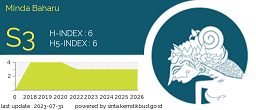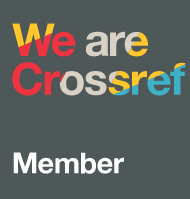PENGUATAN PROFESIONALISME GURU MELALUI PELATIHAN BERBASIS BLENDED DI KABUPATEN PADANG LAWAS
Abstract
Keywords
Full Text:
PDFReferences
Abdullah, W. (2018). Model Blended Learning dalam Meningkatkan Efektifitas Pembelajaran. Jurnal Fikrotuna, Volume 7(1), 855-866.
Agus Subaidi, Moh Zayyadi, Hasanah. I. S, dan Durroh Halim. (2019). Pelatihan Blended Learning bagi Guru di Lingkungan Madrasah Tsanawiyah Negeri Sumber Bungur. JPM (Jurnal Pemberdayaan Masyarakat), Volume 4(2), 2019.
Ahmad, Perwira Negara, H. R., Ibrahim, M., & Etmy, D. (2020). Pelatihan Pembelajaran Daring (Google Classroom) bagi Guru MTs dan MI Nurul Yaqin Kelanjur. JPMB : Jurnal Pemberdayaan Masyarakat Berkarakter, 3(1), 66–79.
Atma, B.A., Azahra, F.F., Mustadi, A.,& Adina, C.A. (2021). Teaching Style, Learning Motivation, And Learning Achievement: Do They Have Significant And Positive Relationships?. Jurnal Prima Edukasia, Volume 9(1), 23-31.
Dahar, R.W. (2011). Teori-Teori Belajar dan Pembelajaran. Jakarta: Erlangga.
Dwirahayu, G., Satriawati, G., Afidah., & Hafiz, M. (2020). Analysis Of Mathematics Teachers’ Pedagogical Competency In Madrasah Tsanawiyah (Mts) In Developing Scientific-Based Lesson Plan. Jurnal Pendidikan dan Kebudayaan, Volume 5(1), 2020.
Hidayat.M.T, Teuku Junaidi, Effendi. D.I. (2020). Pelatihan Blended Learning Melalui Aplikasi Mobile Bagi Guru SMP pada Masa Pandemi Covid-19. International Journal of Community Service Learning, Volume 4(3), 200-208.
J.J. De Simone. (2020). The Roles of Collaborative Professional Development, Self-Efficacy, and Positive Affect in Encouraging Educator Data Use to Aid Student Learning, Teacher Development. An International Journal of Teachers' Professional Development. DOI: 10.1080/13664530.2020.1780302.
K.A. Omenka dan E.E. Otor. (2015). Influence of Classroom Management on Students’ Academic Achievement in Science and Mathematics in Oju Local Government Area of Benue State. Global Journal of Interdisciplinary Social Science, volume 4(4), 36-40.
Lantip, D.P., Wibowo, U.D., & Arum, D.H. (2017). Curriculum Management Of Teacher Professional Program For Frontier, Outermost, And Least Developed Regions In Universitas Negeri Yogyakarta. Jurnal Pendidikan dan Kebudayaan, Vol. 2, Nomor 1, Juni 2017.
Lestari, Y.A. & Purwanti, M. (2018). Hubungan Kompetensi Pedagogik, Profesional, Sosial, dan Kepribadian Pada Guru Sekolah Nonformal X. Jurnal Kependidikan, 2(1),197-208.
Lia Yuliana. (2019). Achievement Of National Education Standards In Senior Secondary Schools. Jurnal Pendidikan dan Kebudayaan, Volume 4(2), 2019.
Maulipaksi, D. (2016). Tujuh Provinsi Uji Kompetensi Guru 2015. https://s.id/wP3Nw dikases pada hari Minggu, 08 Agustus 2021 Pukul 10.15 Wib
Napitupulu, Rodame Monitorir. (2020). Dampak Pandemi Covid-19 Terhadap Kepuasan Pembelajaran Jarak Jauh. Jurnal Inovasi Teknologi Pendidikan 7(1), 23-33.
Ningsih, Y. L., Misdalina, M., & Marhamah, M. (2017). Peningkatan Hasil Belajar dan Kemandirian Belajar Metode Statistika Melalui Pembelajaran Blended Learning. Al-Jabar: Jurnal Pendidikan Matematika, 8(2), 155-163.
Olga N. (2012). The Competencies of the Modern Teacher. Paper presented at the Annual Meeting of the Bulgarian Comparative Education Society (10th, Kyustendil, Bulgaria, Jun 12-15, 2012). https://files.eric.ed.gov/fulltext/ED567059.pdf.
Peklaj, C. (2015). Teacher Competencies Through the Prism of Educational Research. Center for Educational Policy Studies Journal, 5(3), 183-204.
Peraturan Kementerian Pendidikan dan Kebudayaan Republik Indonesia Nomor 22 Tahun 2020 Tentang Rencana Strategi Kementerian Pendidikan dan Kebudayaan.
Pohan, E.A., Daulay, H.M., & Sahrir, A. (2021). Improving Teachers’ Professionalism Through Blended-Based Training in Indonesia’s Remote Area. London Journal of Social Sciences, Volume 1(1), 67-78.
Rahayu, Retno Puji, and Yanty Wirza. (2020). Teachers’ Perception of Online Learning during Pandemic Covid-19. Jurnal Penelitian Pendidikan, Volume 2(2), 392-406.
Rohmat Sulistiya. (2019). Heutagogy As A Training Approach For Teachers In The Era Of Industrial Revolution 4.0. Jurnal Pendidikan dan Kebudayaan, Volume 4(2), 2019.
Sally B. Gutierez. (2020). Collaborative Lesson Planning as a Positive ‘Dissonance’ to the Teachers’ Individual Planning Practices: Characterizing the Features Through Reflections-On-Action, Teacher Development. An International Journal of Teachers' Professional Development. DOI: 10.1080/13664530.2020.1856177.
Saovapa Wichadee. (2017). A Development of the Blended Learning Model Using Edmodo for Maximizing Students’ Oral Proficiency and Motivation. International Journal of Emerging Technologies in Learning, Volume 12(2), 2017.
Selvi, K. (2010). Teachers’ Competencies. Cultura. International Journal of Philosophy of Culture and Axiology, 7(1),167-175.
Siswandari dan Susilaningsih. (2013). Dampak Sertifikasi Guru Terhadap Peningkatan Kualitas Pembelajaran Peserta Didik. Jurnal Pendidikan dan Kebudayaan, 19(4), 487-498.
Sugiyono, Sugiyono. (2019). Metode Penelitian Manajemen Pendekatan Kuantitatif, Kualitatif, Kombinasi (Mixed Method), Penelitian Tindakan (Action Research), Dan Penelitian Evaluasi. In Book Chapter, ed. Setiyawan. Bandung: Alfabeta.
Sujana, I.M., Waluyo, U., Soepriyanti, H., dan Arifuddin. (2019). Workshop Pengembangan Blended learning Berbasis Google Classroom (GC) sebagai Solusi Pembelajaran dan Penelitian Tindakan Kelas (PTK). Jurnal Pendidikan dan Pengabdian Masyarakat, Volume 2(1), 2019.
Sulyman Kamaldeen Olohundare. (2020). Assessment of Teachers’ Dedication, Discipline, Knowledge and Skills in Kwara State Basic Schools, Nigeria. Journal of Education and Learning (EduLearn), Volume 14(4), 537-542.
Sunday Bello Abusomwan dan Louis Osaigbovo. (2020). Competency Improvement Needs of Teachers of Brick/Block Laying and Concreting Works. Journal of Education and Learning (EduLearn), Volume. 14(4), 517-524.
Syarifuddin, A. (2011). Penerapan Model Pembelajaran Cooperative Belajar dan Faktor-Faktor yang Mempengaruhinya. Ta’dib: Journal of Islamic Education (Jurnal Pendidikan Islam), 16(1), 113-136.
Syauqi, Khusni, Sudji Munadi, and Mochamad Bruri Triyono. (2020). Students’ Perceptions toward Vocational Education on Online Learning during the COVID-19 Pandemic. International Journal of Evaluation and Research in Education, Volume 9(4), 81-86.
Tina Stemberger. (2020). The Teacher Career Cycle and Initial Motivation: The Case of Slovenian Secondary School Teachers, Teacher Development. An International Journal of Teachers' Professional Development. Volume 24(5), 709-726.
Tubagus, M., Muslim,S. & Suriani. (2019). The Impact of the Development of Blended Learning Models Using Computer Applications In Higher Education. International Journal of Educational Research Review, 4(4), 573-581.
Usman, U. (2019). Komunikasi Pendidikan Berbasis Blended Learning Dalam Membentuk Kemandirian Belajar. Jurnal Jurnalisa, Volume 4 (1), 136-150.
Wai, C. C., & Seng, E. L. K. (2014). Exploring the Effectiveness and Efficiency of Blended Learning Tools in a School of Business. Procedia-Social and Behavioral Sciences, 123, 470-476.
DOI: https://doi.org/10.33373/jmb.v5i2.3424
Refbacks
- There are currently no refbacks.
License URL: https://creativecommons.org/licenses/by/4.0/

Ciptaan disebarluaskan di bawah Lisensi Creative Commons Atribusi 4.0 Internasional.
















